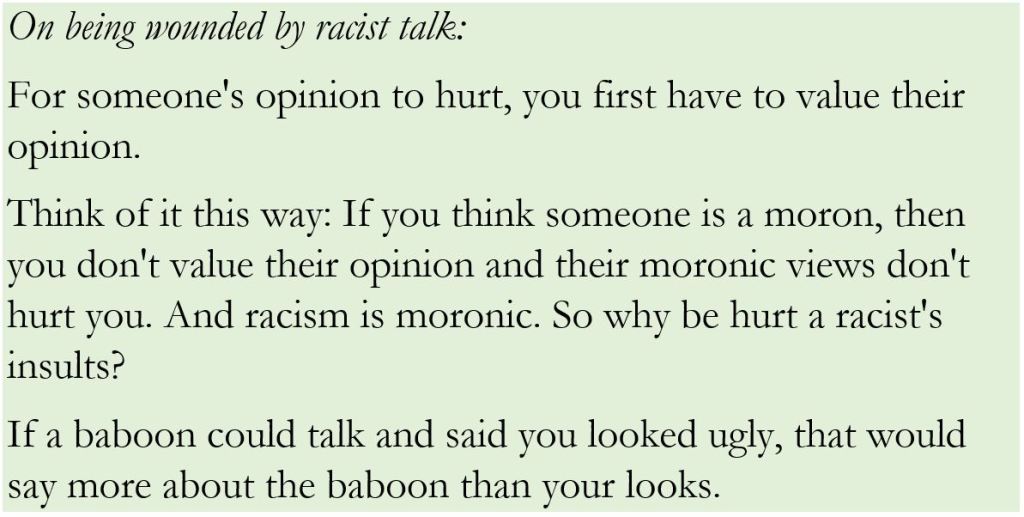For someone’s opinion to hurt, you first have to value their opinion.
Think of it this way: If you think someone is a moron, then you don’t value their opinion and their moronic views don’t hurt you. And racism is moronic. So why be hurt by a racist’s insults?
If a baboon could talk and said you looked ugly, that would say more about the baboon than about your looks.

It’s a bit more complicated.
Let’s assume there is a huge lumpenproletariat. By definition they are thick and prepared to follow any populist leader. Populist leader emerges who catches the ear of the lumpenproletariat and, bang, we are in Nazi Germany again.
The point being, it’s not a question of valuing the opinion of the racist or not, it’s the contempt for ordinary people who are easily led. As an example, one might rate the ability of say Donald Trump to whip up a crowd, but have no respect for what he says. The key fact is the crowd must be morons.
I’ve discussed this post at length here:
https://irfankhawajaphilosopher.com/2021/06/20/on-being-wounded-by-injustice-a-response-to-stephen-hicks/
In the introduction to _The Fountainhead_, Rand credits her husband with helping her to maintain an unbroken spirit “over a long span of years when there was nothing around us but a gray desert of people and events that evoked nothing but contempt and revulsion.” On your view, why would she need such help? Would you say that Rand was being irrational in letting her spirit be affected by people for whom she felt only “contempt and revulsion”?
Likewise, in her obituary for Marilyn Monroe, Rand describes how, as she sees it, Monroe’s spirit was broken by the “swamp of malice” she encountered. She doesn’t say “why did she care about the malice of vicious idiots?” Instead she asked: “How long do you think a human being could stand it?” Would you say Rand’s sympathy for Monroe was irrational?
https://ari.aynrand.org/issues/culture-and-society/culture-and-society-more/through-your-most-grievous-fault/
One’s estimations of others lie along a spectrum, esteeming more highly the good people and less highly or not at all the bad people. Of course that is not easy to do accurately, especially if one has a generalized optimistic view of humans and wants benevolent relations with them. So one will make mistakes: hoping for benevolence from others and being surprised and hurt when some of them are malevolent. So the point of my suggestion is as a corrective in such cases: remember that you’re the good person and that the malevolent one has the problem. That person needs to be relocated much lower on your estimation spectrum.
Zora Neale Hurston expressed it perfectly: “Sometimes, I feel discriminated against, but it does not make me angry. It merely astonishes me. How can any deny themselves the pleasure of my company? It’s beyond me.” [Source: “How It Feels to Be Colored Me” (1928).]
Thanks, Irfan. I posted this at your site too:
“Thanks for this response, Irfan.
At my website, I had posted this note to Roderick before seeing your response-article:
‘One’s estimations of others lie along a spectrum, esteeming more highly the good people and less highly or not at all the bad people. Of course that is not easy to do accurately, especially if one has a generalized optimistic view of humans and wants benevolent relations with them. So one will make mistakes: hoping for benevolence from others and being surprised and hurt when some of them are malevolent. So the point of my suggestion is as a corrective in such cases: remember that you’re the good person and that the malevolent one has the problem. That person needs to be relocated much lower on your estimation spectrum.
‘Zora Neale Hurston expressed it perfectly: “Sometimes, I feel discriminated against, but it does not make me angry. It merely astonishes me. How can any deny themselves the pleasure of my company? It’s beyond me.” [Source: “How It Feels to Be Colored Me” (1928).]’
To return to your response, Irfan. Please note that you’re responding to a highly compressed meme. In unpacking, I think you’re right that this element is key: [Quoting Irfan]: “the relevant issue is not the victim’s valuation of the beliefs of the perpetrator, but the expectations we all bring to human relations. As a basic background fact, when we deal with others, we expect them to show us a certain minimally decent degree of respect for our humanity.” That’s in the area, but still not quite right, as we have to integrate two facts: (1) We want to expect minimal respect for our humanity, but (2) We know very well we live in a world with lots of people who don’t do that. So, being morally healthy people but no longer being naive children, how do we go forth into the world? My suggestion, captured in the meme, is to build into your self-esteem a more-or-less automated response to anyone who fails to live up to your expectations: It’s their problem, not yours.
That is to say, *both* your generalized expectations for how humanity treats you *and* you-as-victim’s valuation of the perpetrator are relevant — but when those clash you-as-hurt-victim has a semi-automated response ready to go that minimizes the hurt and makes it less likely you will make the same mistake again.”
Irfan,
Your reply seems to misconstrue the meme as an argument instead of as advice, so it reads to me like a long tangent.
Stephen’s meme reads like an argument, not mere advice.
Regarding Stephen’s follow-up suggestion “captured in the meme, is to build into your self-esteem a more-or-less automated response to anyone who fails to live up to your expectations: It’s their problem, not yours”; that is profoundly naive. We are human beings, not robots.